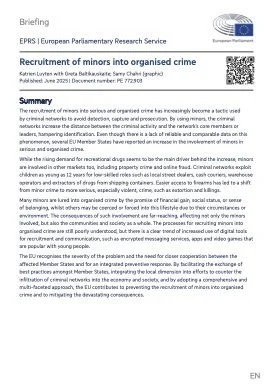By Katrien Luyten with Greta Baltikauskaite; Samy Chahri (graphics)
The recruitment of minors into serious and organised crime has increasingly become a tactic used by criminal networks to avoid detection, capture and prosecution. By using minors, the criminal networks increase the distance between the criminal activity and the network's core members or leaders, hampering identification. Even though there is a lack of reliable and comparable data on this phenomenon, several EU Member States have reported an increase in the involvement of minors in serious and organised crime. While the rising demand for recreational drugs seems to be the main driver behind the increase, minors are involved in other markets too, including property crime and online fraud. Criminal networks exploit children as young as 12 years for low-skilled roles such as local street dealers, cash couriers, warehouse operators and extractors of drugs from shipping containers. Easier access to firearms has led to a shift from minor crime to more serious, especially violent, crime, such as extortion and killings. Many minors are lured into organised crime by the promise of financial gain, social status, or sense of belonging, whilst others may be coerced or forced into this lifestyle due to their circumstances or environment. The consequences of such involvement are far-reaching, affecting not only the minors involved, but also the communities and society as a whole. The processes for recruiting minors into organised crime are still poorly understood, but there is a clear trend of increased use of digital tools for recruitment and communication, such as encrypted messaging services, apps and video games that are popular with young people. The EU recognises the severity of the problem and the need for closer cooperation between the affected Member States and for an integrated preventive response. By facilitating the exchange of best practices amongst Member States, integrating the local dimension into efforts to counter the infiltration of criminal networks into the economy and society, and by adopting a comprehensive and multi-faceted approach, the EU contributes to preventing the recruitment of minors into organised crime and to mitigating the devastating consequences.
Brussels: European Parliamentary Research Service, 2025. 12p.



